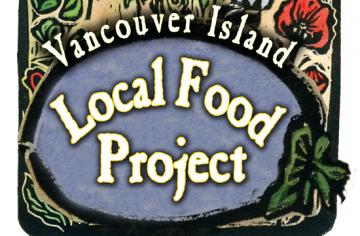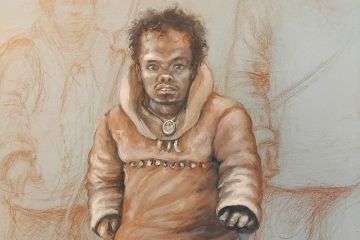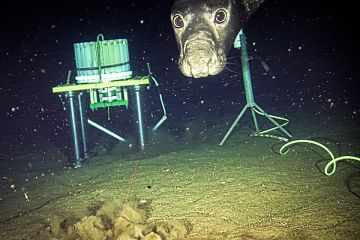Island food security means bounty for future
- Tara Sharpe

It's well past the 12 days of Christmas and holiday feasting, but as Canadians calculate the cost of December 2011, they may experience firsthand what a recent Statistics Canada report tells us about the annual inflation rate. The price of fresh vegetables is up 13.2 per cent and bread up 11.9 per cent. But it’s not just high prices or earthquakes that could shake or break the fragile links that feed Vancouver Island residents.
A new report released this winter by the Vancouver Island Community Research Alliance (VICRA)--of which UVic is a member--points out that less than 150 years ago, there was an abundance of food available for Island inhabitants, yet now the majority of our food is imported from off island.
The report proposes a plan for producing and keeping food on the Island. It explores how a changing global climate and existing food systems can be counterbalanced or augmented by traditional wisdoms, urban agricultural initiatives and enhanced purchasing policies.
It is the result of an 18-month research collaboration funded by the Social Sciences and Humanities Research Council and including all five VICRA members—UVic, Royal Roads University, Camosun College, Vancouver Island University and North Island College. The project was co-ordinated by UVic’s Office of Community Based Research and led by Lifecycles Project Society founder and UVic research associate Linda Geggie and project principal investigators Dr. Aleck Ostry (geography) and Dr. John Lutz (history).
“This project helps people on Vancouver Island predict and prepare for the changes that are coming and in fact are already here,” says Ostry, Canada Research Chair in Social Determinants of Community Health. “There is a need for a progressive deconstruction of the food system, in order to better understand how it works, and development of policy making along a broad continuum—from food production to dietary health.”
Ostry, Geggie and Lutz were assisted in their work by the efforts of VICRA faculty, students and researchers as well as food and community groups. Nearly two years of research and collaboration culminated in Fall/Winter 2011 with a plan for action focused on the four theme areas: climate chan#8805; Indigenous food systems; urban agriculture; and institutional food purchasing.
The research and outreach project was also the basis of a food systems course in UVic’s School of Environmental Studies (Fall 2010) and the catalyst for the publication of digital stories and new maps as well as the reason for numerous presentations and workshops.
It provided a unique training and apprenticeship opportunity for over 60 post-secondary students. Sixteen post-secondary students, from each of the VICRA partners, were awarded internships to assist with the collection and dissemination in the four strategy areas.
“The ability to draw on the resourcefulness of students, and to coordinate their work across the Island campuses, was a real strength of the project,” says Geggie. “Many students are interested in food issues and this project allowed them to combine their passion with academic pursuits. They were able to work with faculty and community members to gather knowledge and engage partners in not only recommendations but also actions that help to build a strong er Island food system.”
Lutz adds, “We wanted to harness the energy of students and introduce the first taste of what a secure, long-term and sustainable food system could do for our Island.”
On Nov. 29, 2011, the project findings were presented at a food gala evening in downtown Victoria’s Atrium building, bringing together VICRA members, LifeCycles representatives, farmers and chefs, food producers and eaters as well as academics and youth activists, local politicians and other interested parties. Click here for columnist Jack Knox's coverage of the event.
The report describes specific opportunities for academics, policy makers and the general public to take action to increase Vancouver Island’s food self-sufficiency, all of which would increase the supply of local food; a knowledge of food security; and support to local producers.
“To put it more bluntly,” says Ostry, “we need more empirical information locally, regionally, provincially, and nationally about what we produce, how we produce it, how and where we process it, how markets work that control food movements and food supply-chain structure, how we distribute food, how we retail it, and what policy levers move the disparate pieces of this system.
“And we need to know its complicated and nuanced history. We are then in a position, with this knowledge attained and organized, to offer coherent advice to policy makers about environment, sustainability, and health related aspects of growing, distributing, and retailing food.
“Many in the health and food security research communities have spoken about the need to support local farmers by ‘buying local.’ One way is through farmers’ markets and another powerful way is to encourage large institutions like universities and hospitals to buy locally.”
UVic’s alumni magazine, The Torch, published a Spring 2011 article about assessing the consequences of food choices and included comment from Geggie and Ostry.
Visit the alliance's website for more info on the food project, its digital stories, final report and details about a local food pledge.
VICRA was established in April 2009 with a formal agreement to come together in mobilizing research and knowledge to help local communities.
Photos
In this story
Keywords: research





